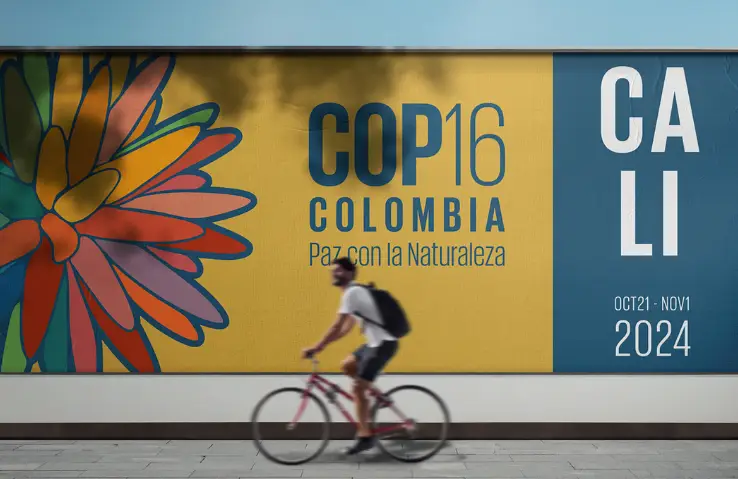The United Nations Biodiversity Conference (COP16), held in the city of Cali between October 21 and November 1, 2024, is a diplomatic achievement for Colombia, insofar as the country managed to host the most important international event on biodiversity in the world. The event raised the profile of Colombian foreign policy, which has traditionally aligned with initiatives led by other nations but has seldom taken an active leadership role, with a few exceptions.
Although one journalist minimized the importance of the COP and compared it to a Champions League final, public opinion favored the event and even representatives of the opposition participated, even though they did not give credit to the government for its realization. It should be remembered that the COP takes place in a context of governance crisis of Petro’s government, which was recently fueled by the controversial investigation of the president by the National Electoral Council for irregularities in his campaign.
Over the past decade, environmental issues have taken on greater importance within Colombia’s domestic and international agendas. Under President Gustavo Petro’s administration, however, this focus has intensified. The current government has prioritized environmental concerns, as highlighted in the National Development Plan (2022–2026) and in proposals presented at various international environmental forums. In this way, Petro’s administration has demonstrated strong leadership in environmental matters, not only within the region but also on the global stage.
Even though countries such as Brazil and leaders such as Lula da Silva have greater experience in such issues, Colombia is insisting before international forums on proposals such as the exchange of foreign debt for climate action and criticizing the development model based on dependence on fossil fuels. This difference has, in fact, created tension between the two presidents, as Lula has defended—and even promoted—oil exploitation in the Amazon.
The COP16, which broke attendance records, was held in Cali, a sociodemographic and environmental diverse city, protagonist of the social outburst of 2021 and that has also entered the rankings of the most violent city in Colombia. In any case, the city had been preparing for several months. Alongside efforts to improve urban spaces, increase militarization, and establish strict security protocols, it’s important to note that Iván Mordisco, leader of the Central General Staff—a dissident faction of the FARC guerrilla—threatened to attack the COP in response to issues with government negotiations.
Despite some challenges, the city’s residents eagerly anticipated the event. The Convention on Biological Diversity (CBD) brought international visibility to Cali, drawing thousands of participants to the city. In one area, formal conferences and diplomatic negotiations took place, while another zone hosted cultural and academic activities. According to data from the Ministry of the Environment, these events attracted over 900,000 attendees.
Despite some media criticism regarding the absence of certain presidents, the COP launched the High-Level Segment for the first time, featuring six heads of state, including President Gustavo Petro. Alongside UN Secretary General António Guterres, a wide range of ministers, officials, agencies, and numerous environmental organizations from around the world also participated.
Despite being a diplomatic event, Colombia made a great effort to democratize the COP, going beyond the formal negotiations and involving environmental leaders, social movements and various sectors of civil society who are, ultimately, the actors capable of demanding compliance with the agreements reached and promoting the defense of the environment.
COP16 achievements
In addition to the mobilization of resources for the preservation of biodiversity in Colombia and the promotion of declarations to strengthen biodiversity protection laws and promote programs and actions that involve civil society in environmental protection, one of the great achievements of the event was the creation of a body for indigenous peoples and local communities, as well as the recognition of Afro-descendant peoples as custodians of biodiversity. This coincides with the imprint of this COP, called the COP of the people, which sought to give greater participation to indigenous peoples, Afro-descendants, peasants and other environmental leaders.
COP16 is a great achievement for Colombian foreign policy. It is no coincidence that within the framework of the COP and thanks to Colombia’s diplomatic efforts, the election of the Secretary General of the Amazon Cooperation Treaty Organization (ACTO) was unblocked, and the Colombian Martin von Hildebrand was appointed, allowing the organization, which is key to the conservation of the Amazon, to resume its operations.
The leading role of Susana Muhamad, Minister of the Environment and President of the COP, who has been an outstanding international activist and was recently named Woman of the Decade in Colombia by the Women Economic Forum, should be highlighted.
Given the obstacles that President Petro has had to advance his internal agenda due to the lack of majorities in Congress and the strong opposition, this event demonstrates the room for maneuver that the government has to move forward with its foreign agenda, since this event largely materialized the president’s speeches inside and outside Colombia in which the environmental agenda is prioritized.
However, COP16 is not merely an outcome. It marks the beginning of efforts to tackle ongoing challenges, such as deforestation and the pursuit of environmental peace—both essential for protecting biodiversity.













